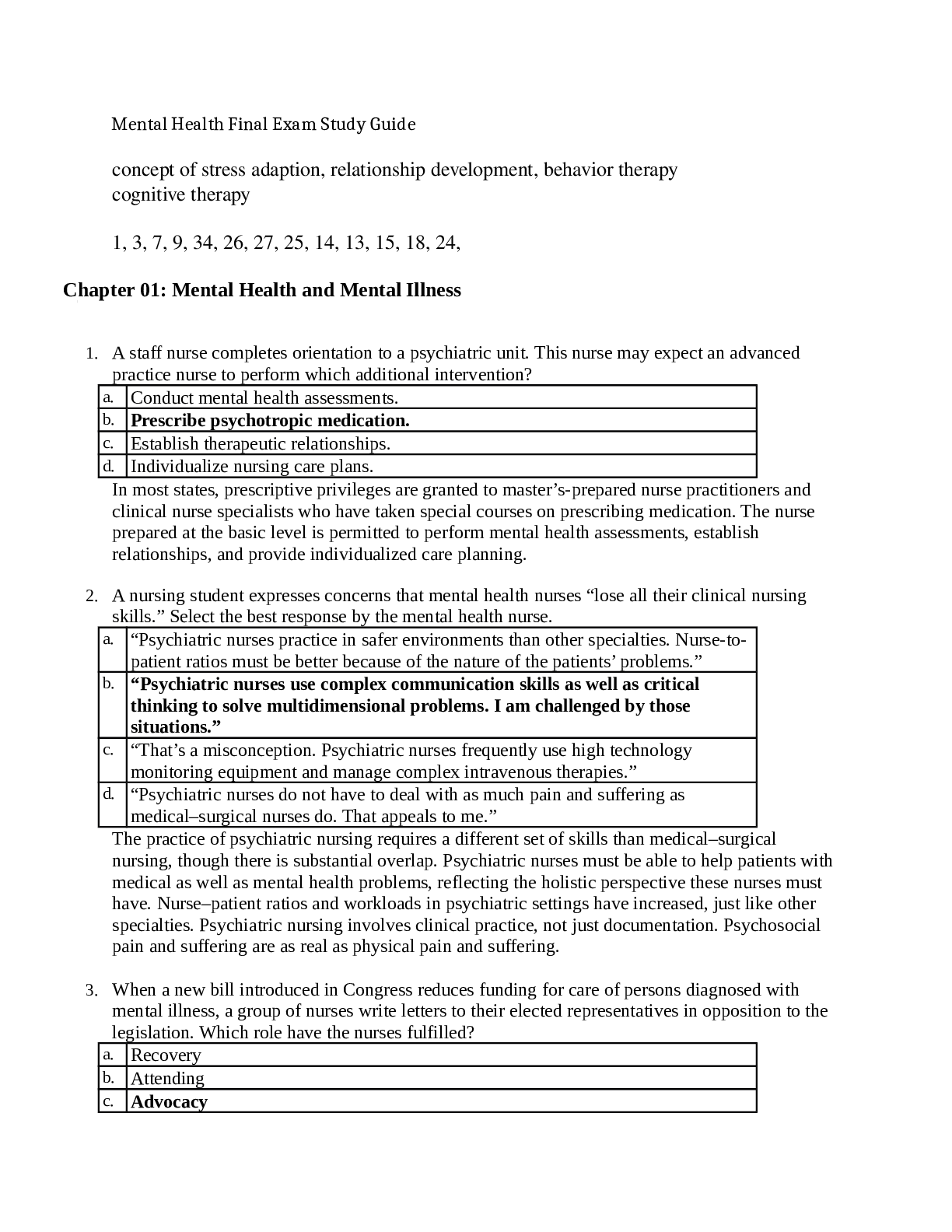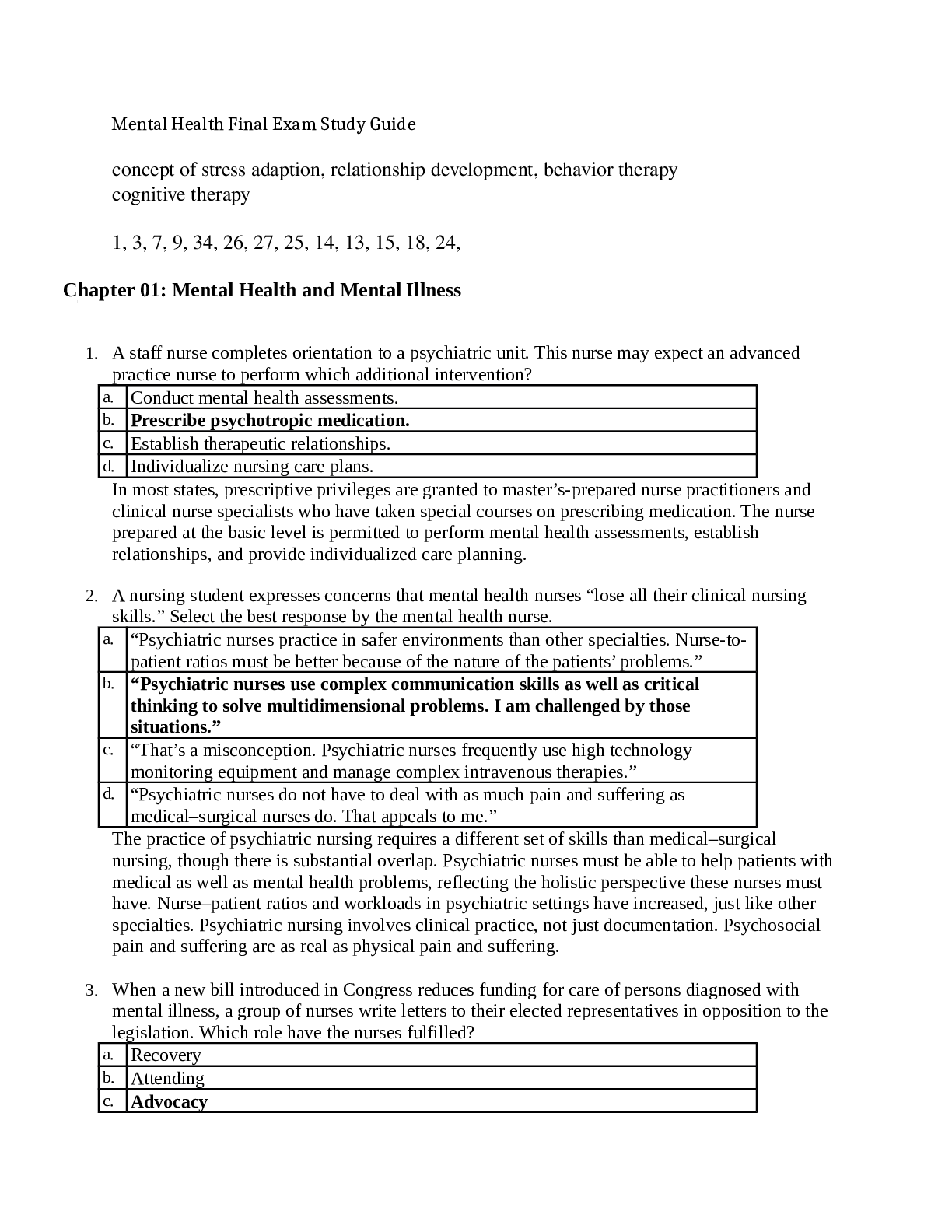concept of stress adaption, relationship development, behavior therapy
cognitive therapy
1, 3, 7, 9, 34, 26, 27, 25, 14, 13, 15, 18, 24,
Chapter 01: Mental Health and Mental Illness
1. A staff nurse completes orientation to a psychiatric unit. This nurse may expect an advanced
practice nurse to perform which additional intervention?
a.
Conduct mental health assessments.
b.
Prescribe psychotropic medication.
c.
Establish therapeutic relationships.
d.
Individualize nursing care plans.
In most states, prescriptive privileges are granted to master’s-prepared nurse practitioners and
clinical nurse specialists who have taken special courses on prescribing medication. The nurse
prepared at the basic level is permitted to perform mental health assessments, establish
relationships, and provide individualized care planning.
2. A nursing student expresses concerns that mental health nurses “lose all their clinical nursing
skills.” Select the best response by the mental health nurse.
a. “Psychiatric nurses practice in safer environments than other specialties. Nurse-to-
patient ratios must be better because of the nature of the patients’ problems.”
b. “Psychiatric nurses use complex communication skills as well as critical
thinking to solve multidimensional problems. I am challenged by those
situations.”
c. “That’s a misconception. Psychiatric nurses frequently use high technology
monitoring equipment and manage complex intravenous therapies.”
d. “Psychiatric nurses do not have to deal with as much pain and suffering as
medical–surgical nurses do. That appeals to me.”
The practice of psychiatric nursing requires a different set of skills than medical–surgical
nursing, though there is substantial overlap. Psychiatric nurses must be able to help patients with
medical as well as mental health problems, reflecting the holistic perspective these nurses must
have. Nurse–patient ratios and workloads in psychiatric settings have increased, just like other
specialties. Psychiatric nursing involves clinical practice, not just documentation. Psychosocial
pain and suffering are as real as physical pain and suffering.
3. When a new bill introduced in Congress reduces funding for care of persons diagnosed with
mental illness, a group of nurses write letters to their elected representatives in opposition to the
legislation. Which role have the nurses fulfilled?
a. Recovery
b. Attending
c. Advocacy
d. Evidence-based practice
An advocate defends or asserts another’s cause, particularly when the other person lacks the
ability to do that for self. Examples of individual advocacy include helping patients understand
their rights or make decisions. On a community scale, advocacy includes political activity, public
speaking, and publication in the interest of improving the human condition. Since funding is
necessary to deliver quality programming for persons with mental illness, the letter-writing
campaign advocates for that cause on behalf of patients who are unable to articulate their own
needs.
4. A family has a long history of conflicted relationships among the members. Which family
member’s comment best reflects a mentally healthy perspective?
a.
“I’ve made mistakes but everyone else in this family has also.”
b.
“I remember joy and mutual respect from our early years together.”
c.
“I will make some changes in my behavior for the good of the family.”
d.
“It’s best for me to move away from my family. Things will never change.”
The correct response demonstrates the best evidence of a healthy recognition of the importance
of relationships. Mental health includes rational thinking, communication skills, learning,
emotional growth, resilience, and self-esteem. Recalling joy from earlier in life may be healthy,
but the correct response shows a higher level of mental health. The other incorrect responses
show blaming and avoidance.
Read More


